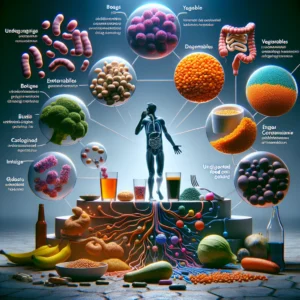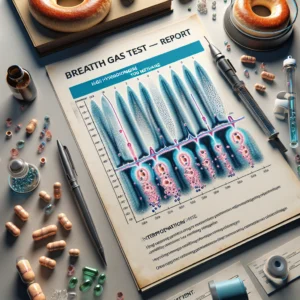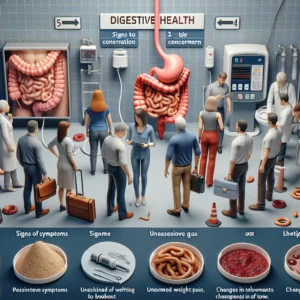Enhance Your Digestive Well-Being: Combat Bloating with Breath Gas Chromatography
Bloating is a common and often uncomfortable condition that affects a significant number of individuals. This distressing sensation is characterized by a feeling of excessive fullness and swelling in the abdomen, which can lead to a range of symptoms including abdominal pain, discomfort, and even social embarrassment. While infrequent episodes of bloating can be linked to certain dietary choices or eating habits, persistent or severe bloating may indicate an underlying digestive disorder requiring professional evaluation. Understanding the complex mechanisms that contribute to bloating is essential for effectively managing symptoms and promoting long-term digestive health.
Recognizing and addressing the <a href=”https://mcrtherapies.co.uk/breath-gas-chromatography-for-better-gut-health/”>root causes of bloating</a> is crucial for alleviating discomfort. Breath gas testing has emerged as a pioneering diagnostic tool in the realm of gastrointestinal health, offering a non-invasive approach for healthcare professionals to analyze the gases present in an individual's breath. This advanced analysis provides invaluable insights into the digestive processes and helps uncover potential issues that may be contributing to bloating.
Breath gas chromatography plays a pivotal role in identifying imbalances within the gut microbiome and detecting disorders such as small intestinal bacterial overgrowth (SIBO). By measuring specific gases like hydrogen and methane, this innovative methodology not only aids in diagnosing the underlying causes of bloating but also plays a crucial role in developing personalized treatment plans designed to alleviate discomfort.
Proven Methods to Effectively Manage Bloating and Excess Gas
- Bloating and excessive gas can profoundly disrupt daily life, impacting both physical comfort and emotional well-being.
- Common factors contributing to bloating and gas include dietary choices, medical conditions, and various lifestyle habits that can aggravate symptoms.
- Utilizing breath gas testing serves as a non-invasive diagnostic approach to identify specific gases present in breath samples, leading to targeted treatment.
- Interpreting breath gas test results can reveal conditions such as lactose intolerance and SIBO, paving the way for effective management strategies.
- Successful management strategies for bloating and excessive gas often involve dietary adjustments, medications, and lifestyle changes tailored to individual needs.
 Identify Key Triggers of Bloating and Excess Gas for Effective Management
Identify Key Triggers of Bloating and Excess Gas for Effective Management
Bloating and excessive gas can emerge from a multitude of underlying factors, making it essential to identify these triggers for effective management. One common contributor is dietary habits, particularly foods high in fiber or fermentable carbohydrates, which can lead to increased gas production during digestion.
For example, foods like beans, lentils, cruciferous vegetables, and carbonated drinks can provoke bloating sensations due to their fermentable nature. Furthermore, eating too quickly or consuming large meals can exacerbate bloating by allowing excess air to be swallowed, further complicating the issue. Another significant factor influencing bloating is the condition of your gut microbiome, where an imbalance can lead to digestive irregularities.
An imbalance in the diversity and quantity of bacteria in the intestines can disrupt normal digestive processes. For instance, an overgrowth of bacteria in the small intestine can ferment undigested food, resulting in gas production and discomfort. This condition, commonly referred to as SIBO, can lead to chronic bloating. Additionally, high levels of stress and anxiety can exacerbate bloating symptoms, disrupting digestive functions and impairing gut motility, further complicating the situation.
Thorough Diagnostic Approaches for Persistent Bloating and Excess Gas
When bloating and excessive gas become chronic issues, it is essential to implement a thorough diagnostic strategy to uncover the underlying cause. Your healthcare provider will typically begin with a comprehensive medical history and physical examination to evaluate your symptoms and any contributing factors. This assessment may include inquiries about your eating habits, lifestyle choices, and any additional symptoms you may be experiencing.
This detailed evaluation assists in narrowing down potential causes and determining the most appropriate diagnostic tests. Beyond a thorough history and physical examination, various diagnostic methods may be employed to investigate the origins of your bloating. Blood tests can help rule out conditions such as celiac disease or infections, while imaging studies like ultrasounds or CT scans can provide visualization of any structural abnormalities within the gastrointestinal tract.
Breath gas testing is increasingly recognized as an effective means of diagnosing specific conditions like SIBO, allowing for a more focused and targeted approach to treatment and management of bloating and gas.
Revolutionizing Digestive Disorder Diagnosis: The Role of Breath Gas Testing
The use of breath gas testing, primarily through Breath Gas Chromatography, has revolutionized the diagnostic landscape for healthcare providers managing digestive disorders associated with bloating. This non-invasive procedure usually involves ingesting a specific substrate—often lactulose or glucose—followed by the collection of breath samples at predetermined intervals. As the substrate passes through the digestive system, it undergoes fermentation by any excess bacteria present, leading to gas production.
The gases, primarily hydrogen and methane, are then measured from the collected breath samples. The scientific foundation of breath gas testing lies in its capacity to detect abnormal levels of these gases, indicating bacterial overgrowth or premature fermentation processes occurring in the small intestine. For example, in cases of SIBO, bacteria in the small intestine ferment the substrate too early, leading to elevated levels of hydrogen or methane in the breath.
This method provides critical diagnostic information and informs treatment strategies tailored specifically to your unique digestive condition, enhancing the overall effectiveness of your care.
 Decoding Breath Gas Test Results for Customized Treatment Solutions
Decoding Breath Gas Test Results for Customized Treatment Solutions
Understanding breath gas test results necessitates a nuanced comprehension of the implications of hydrogen and methane levels concerning your digestive health. Elevated hydrogen levels typically indicate an overgrowth of bacteria in the small intestine that ferments carbohydrates prematurely, contributing to bloating. Conversely, high levels of methane can suggest a different type of bacterial overgrowth associated with constipation and other gastrointestinal complications.
Your healthcare provider will analyze the timing and intensity of gas production in relation to your substrate ingestion. A rapid increase in hydrogen or methane levels shortly after consumption can confirm a diagnosis of SIBO or related disorders. Grasping these results is crucial for developing an effective treatment plan that addresses both the symptoms of bloating and the underlying causes of your discomfort.
Tailoring Treatment Plans for Bloating and Excessive Gas
Once breath gas testing or other diagnostic methods have confirmed a diagnosis, treatment options for bloating and excessive gas can be customized to meet your individual needs. If SIBO is identified as the primary cause, your healthcare provider might prescribe antibiotics to target the bacterial overgrowth in your small intestine. Rifaximin is a commonly used antibiotic that specifically targets problematic bacteria while minimally disrupting the gut microbiome.
Dietary changes are also essential in managing bloating and excessive gas alongside antibiotic therapy. Implementing a low-FODMAP diet can significantly alleviate symptoms by reducing the intake of certain fermentable carbohydrates that exacerbate bloating. Additionally, probiotics may be recommended to help restore balance in your gut microbiome, enhancing overall digestive health and function.
Your healthcare provider will work closely with you to develop a comprehensive treatment plan addressing immediate symptoms while promoting long-term gut health and overall well-being.
Implementing Lifestyle Changes for Effective Management of Bloating and Excess Gas
Making lifestyle modifications can significantly enhance your ability to manage bloating and excessive gas effectively. One fundamental strategy is to adopt mindful eating habits. By slowing down during meals, thoroughly chewing your food, and minimizing distractions, you can reduce the amount of air swallowed and subsequently diminish gas production.
Moreover, consider transitioning to smaller, more frequent meals instead of consuming large portions that may overwhelm your digestive system. Regular physical activity is another vital component in managing bloating; engaging in moderate exercise can stimulate healthy digestion and alleviate feelings of fullness or discomfort.
Activities such as walking, yoga, or swimming are beneficial as they promote gut motility and can help relieve bloating symptoms. Staying adequately hydrated is equally important; drinking enough water throughout the day supports digestion and helps prevent constipation, which can further exacerbate bloating.
 When to Consult a Medical Professional for Bloating and Excess Gas
When to Consult a Medical Professional for Bloating and Excess Gas
While occasional instances of bloating and excessive gas are common, certain circumstances necessitate immediate medical attention. If you notice that your symptoms are persistent or worsening over time, it is essential to seek the expertise of a healthcare professional for further evaluation. Furthermore, if you experience severe abdominal pain, unexplained weight loss, changes in bowel habits, or blood in your stool, these symptoms may signal more serious underlying conditions requiring urgent care.
Proactively addressing your digestive health is vital for maintaining overall well-being. By thoroughly understanding the potential causes of bloating and employing diagnostic tools like breath gas testing, you can take control of your health journey. Effective management often necessitates a combination of medical intervention, dietary modifications, and lifestyle changes tailored to your specific needs.
Don’t hesitate to seek support when needed; addressing these issues early on can significantly improve your quality of life and provide greater comfort in daily activities.
If you are interested in exploring alternative therapies for weight loss, consider acupuncture. A recent article on mcrtherapies.co.uk highlights acupuncture as an effective method for individuals aiming to meet their weight loss goals. By targeting specific points within the body, acupuncture can help regulate metabolism, reduce cravings, and enhance digestion. This holistic approach may be particularly beneficial for those facing bloating and other digestive challenges.
Frequently Asked Questions About Managing Bloating and Gas
What is bloating, and what are its contributing factors?
Bloating is characterized by a sensation of fullness or tightness in the abdomen, often accompanied by visible swelling or distention. Various factors, including gas accumulation, fluid retention, and digestive complications, can lead to this uncomfortable experience.
What is the mechanism behind breath gas testing?
Breath gas testing is a non-invasive diagnostic measure that quantifies specific gases in a person's breath. This assessment can aid in identifying gastrointestinal disorders such as Small Intestinal Bacterial Overgrowth (SIBO) and lactose intolerance, significantly enhancing diagnostic accuracy.
What is involved in the breath gas testing procedure?
During breath gas testing, the participant exhales into a specialized device designed to collect and analyze their breath. The levels of hydrogen, methane, and other gases indicative of specific digestive issues are then measured and evaluated to provide diagnostic insights.
Which conditions can breath gas testing help identify?
Breath gas testing can assist in diagnosing conditions like SIBO, lactose intolerance, fructose malabsorption, and various other gastrointestinal disorders that may lead to bloating and discomfort, allowing for targeted treatment strategies.
What advantages does breath gas testing offer?
Breath gas testing is non-invasive and generally straightforward to perform. It provides valuable insights regarding an individual's digestive health and aids healthcare providers in personalizing treatment plans to effectively address specific gastrointestinal issues.
Are there risks or side effects associated with breath gas testing?
Breath gas testing is considered safe and is typically well-tolerated by participants. Some individuals may experience mild discomfort or dizziness from repeated breath sampling; however, serious side effects are rare. It is crucial to follow any pre-test instructions provided by your healthcare professional for optimal results.
Presented By: Bloating Treatment
The Article: Bloating and Breath Gas Testing: An Effective Diagnostic Method appeared first on https://mcrtherapies.co.uk
The Article Bloating and Breath Gas Testing for Accurate Diagnosis appeared first on https://mcrtherapies.com
The Article Bloating and Breath Gas Testing for Accurate Diagnosis Solutions Was Found On https://limitsofstrategy.com





Comments are closed